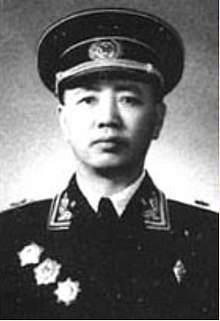Liu Huaqing
Liu Huaqing ( Chinese 劉華清 ; * 1916 ; † January 14, 2011 in Hubei Province ) was a Chinese communist politician , commander in chief of the Navy and a member of the Standing Committee of the Political Bureau of the Chinese Communist Party .
Time of the Long March and the Second World War
After joining the Communist Youth League in October 1929, he joined the Communist Red Army in December 1930. During the time of the Long March 1934/1935 he was entrusted with the organization of the Political Department of the 25th Red Army.
In October 1935, he became a member of the Chinese Communist Party (CCP) . In the following years he took on increasingly important offices within the Red Army. After 1937 he was, among other things, director of the Political Department of the 8th Red Army. After 1941 he worked as an officer in the Hebei military region , where he was most recently deputy political commissar . After 1945 he worked as a political commissar in the military regions of Shanxi , Shandong , Hebei and Henan . Most recently he was head of the Political Department of the 11th Army Corps.
Establishment of the People's Republic of China
After the founding of the People's Republic of China in 1949, he was initially Deputy Rector of the Political School of the People's Liberation Army (VBA) . Between 1951 and 1954 he was initially Deputy Political Commissar of the 10th Army. In 1954 he graduated from the Naval Academy in the Soviet Union . After his return in 1955, he was then promoted to Rear Admiral and Deputy Rector and Deputy Political Commissioner of the Naval Academy.
In 1958 he was first appointed First Deputy Commander and Chief of Staff at the Lushan Naval Base . He later became deputy commander of the North China Sea Fleet Association and commander of the Lushan Naval Base. Later he was head of a research institute at the Ministry of Defense .
In 1965 he was appointed Vice Minister of the 6th Ministry of Mechanical Engineering . 1966 took over the post of the deputy director of the Scientific Committee for National Defense. He was later appointed Deputy Chief of Staff in the Navy.
After 1975 he was again Deputy Director of the Scientific Committee on National Defense. 1979 became deputy chief of the general staff of the VBA.
In August 1982 he was appointed Commander in Chief of the Navy. At the same time he was Deputy Secretary of the Navy Party Committee. After the 12th Congress of the CCP, he was a member of the Central Committee (Central Committee) from 1982 to 1987 . In January 1988, he passed these positions on to his successor, Zhang Lianzhong . During his time as commander in chief, he made a significant contribution to the modernization of the navy.
Promotion to member of the Standing Committee of the Politburo
In 1985 he was elected a member of the Central Advisory Commission. In this office he was re-elected at the 13th Party Congress in 1987. At the same time, due to the influence of Deng Xiaoping, he was elected a member of the Central Military Commission (ZMK) . At first he was its deputy general secretary, before he rose to deputy chairman of the ZMK and admiral in 1988. As deputy chairman of the ZMK he was confirmed in 1993 by the 8th National People's Congress .
At the 14th Congress of the CCP in 1992, he was elected as a member of the CCP Central Committee , a member of the Political Bureau of the Central Committee, and the Standing Committee of the Political Bureau of the Chinese Communist Party . He belonged to the top management of the Chinese party leadership.
At the 15th Party Congress in 1997, however, he resigned from these offices due to his age.
family
One daughter is married to the current Vice Environment Minister Pan Yue .
His daughter Liu Chaoying , who served as a lieutenant colonel in the People's Liberation Army, was embroiled in an election campaign scandal in the United States in 1996 . Today she works for China Aerospace Holdings, the leading Chinese satellite manufacturer .
In 2000, a son was involved in the largest corruption case in the People's Republic of China, in which high-ranking cadres and the military smuggled billions in contraband goods into the country via the port city of Xiamen in Fujian province . The main suspects at the time, the businessman Lai Changxing and the deputy mayor of Xiamen, Lan Fu , had fled abroad (United States and Australia ).
In 2004 he published his memoir.
Liu Huaqing passed away on January 14, 2011 at the age of 95.
Web links
- Sebastian Heilmann: The XV. Communist Party of China Congress: Growing Political Risks of Economic Reform ( Memento of February 18, 2007 in the Internet Archive ). In: Chinappolitik.de
- Harald Maass: Worst case in the history of the VR - the backers are taboo for the judiciary . Report on the corruption scandal in the Tagesspiegel from January 26, 2000
- Michael McDevitt: Ruminations about how little we know about the PLA Navy . Article on the history of the Chinese Navy, October 10, 2000
- H. Lyman Miller: Where have all the Elders gone? (PDF file; 26 kB). Article on the generation change of the Chinese state and party leadership
Individual evidence
| personal data | |
|---|---|
| SURNAME | Liu Huaqing |
| ALTERNATIVE NAMES | 劉華清 (Chinese) |
| BRIEF DESCRIPTION | Chinese admiral and politician (People's Republic of China) |
| DATE OF BIRTH | 1916 |
| DATE OF DEATH | January 14, 2011 |
| Place of death | Hubei Province |
